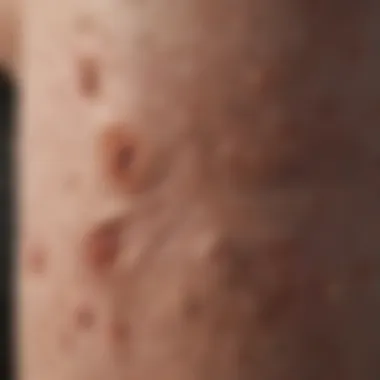Understanding Itchy Psoriasis at Night: Insights and Strategies


Intro
Psoriasis is a chronic skin condition that presents unique challenges, particularly at night when itching intensifies. This article aims to delve into the specifics of nighttime itching associated with psoriasis. By examining physiological, psychological, and environmental factors, we aim to equip readers with effective strategies to manage this distressing symptom. As we explore each aspect in detail, the objective is to provide a well-rounded understanding that is both informative and practical.
Key Concepts and Terminology
Definition of Key Terms
In understanding the issues related to itchy psoriasis at night, some key terms are crucial:
- Psoriasis: A chronic auto-immune condition characterized by hyperproliferation of skin cells, leading to the formation of scales and redness.
- Itching: A sensation that provokes the desire to scratch, which can lead to further skin damage and complications.
- Sleep quality: An assessment of various factors, including duration and depth of sleep, which can be significantly affected by discomfort.
Concepts Explored in the Article
This article explores:
- The physiological mechanisms behind itching in psoriasis.
- The psychological impact of nighttime itching on sleep and overall well-being.
- Effective management strategies, including skin care routines and environmental considerations.
Findings and Discussion
Main Findings
Research indicates that itching in psoriasis can be exacerbated at night due to several factors:
- Inflammation: Increased inflammatory cytokines during sleep can enhance the sensation of itching.
- Skin Barrier Dysfunction: Compromised skin barrier may lead to excessive moisture loss, causing dryness and itching.
- Stress and Anxiety: Psychological factors can intensify the perception of itching, particularly during the quiet hours of night.
"Understanding the interplay between physical symptoms and psychological state is crucial in managing nighttime itching effectively."
Potential Areas for Future Research
- Investigating new therapeutic options targeting itch relief effectively to improve sleep quality for psoriasis patients.
- Studying the long-term psychological impacts of nighttime itching and its relationship with chronic insomnia.
- Exploring the role of different skincare products in mitigating nighttime asthma has the potential to enhance quality of life for individuals affected by psoriasis.
Prelims to Psoriasis and Nighttime Itching
Psoriasis is more than just a skin condition; it affects the daily lives of millions. Understanding its intricacies, especially the aspect of nighttime itching, is vital for both patients and caregivers. This section lays the groundwork for exploring how psoriasis manifests at night and the consequent impact on individuals.
Defining Psoriasis
Psoriasis is a chronic autoimmune disease characterized by rapid skin cell production, leading to the formation of thick, flaky patches. These patches can be red, inflamed, and often itchy. The severity of the condition can vary greatly among individuals, with some experiencing mild symptoms and others enduring severe pain and discomfort. Psoriasis can occur in several forms, including plaque, guttate, inverse, pustular, and erythrodermic. Each type showcases different symptoms, but the common denominator remains: inflammation and irritation of the skin.
The Nighttime Experience for Psoriasis Patients
For individuals with psoriasis, nighttime can introduce a unique set of challenges. As the day winds down, the body enters a restful state; however, for many psoriasis sufferers, this is when itching often escalates. Some experts suggest that the circadian rhythm plays a role here, affecting inflammation and the perception of itchiness as night falls. The result is a disturbing cycle where patients may struggle to fall asleep, face interrupted rest, or wake up feeling fatigued.
The experience of nighttime itching can significantly affect a individual's quality of life. Many people become anxious or frustrated, leading to a heightened awareness of their psoriasis. This can make falling asleep exceedingly difficult.
"Nighttime itching not only disrupts sleep but also can lead to stress and anxiety, which may exacerbate skin conditions," reports a leading dermatological publication.
The interplay between psoriasis and sleep is complicated. Insufficient sleep can amplify symptoms, creating a vicious cycle of itch, discomfort, and sleeplessness. Understanding these dynamics is crucial for effectively managing psoriasis and improving overall well-being.
Physiology of Itchy Psoriasis
Understanding the physiology of itchy psoriasis is crucial for several reasons. It provides insights into the biological mechanisms that underlie the symptoms experienced by individuals afflicted with this condition. Moreover, a deeper knowledge of skin inflammation and immune responses can illuminate effective management strategies. In this section, we will delve into these two key aspects—the nature of skin inflammation and the immune response associated with psoriasis.
Understanding Skin Inflammation


Skin inflammation plays a central role in the manifestation of psoriasis. This chronic condition is characterized by an accelerated life cycle of skin cells, leading to the accumulation of cells on the skin’s surface. This rapid turnover results in the formation of red, scaly patches that are often itchy and uncomfortable. The inflammation is not just a surface issue; it involves the skin’s deeper layers and the immune system.
Inflammatory cells, such as T cells and dendritic cells, infiltrate the skin due to various triggers, including stress, infections, and environmental factors. This infiltration releases inflammatory cytokines, which are signaling proteins that exacerbate the inflammation process. The specific cytokines involved, like tumor necrosis factor-alpha (TNF-alpha) and interleukin-17 (IL-17), contribute to the itching sensation and extensive discomfort typical in psoriasis.
Importance of Managing Inflammation:
Managing skin inflammation is essential because it directly correlates with reducing the frequency and intensity of itching. Strategies may involve topical treatments that target inflammation, and medications that affect the immune response can provide relief.
The Immune Response and Psoriasis
The immune response in psoriasis is a significant area of interest, as it reveals how the body's defensive systems respond to perceived threats. Unlike typical immune responses that target infectious agents, psoriasis presents a misconception where the immune system mistakenly attacks normal skin cells. It creates a cycle of persistent inflammation.
This aberrant immune response often has a genetic component. Certain genes may predispose individuals to psoriasis by affecting immune system function. Stress and environmental factors can exacerbate this genetic tendency, leading to flare-ups.
"A better understanding of immune mechanisms has paved the way for targeted therapies that can dramatically improve symptoms for many patients."
Research continues to explore how modifying immune responses can lead to new treatments that mitigate the itching and discomfort associated with psoriasis. Enhanced therapies not only alleviate symptoms but may also address the root causes of the condition.
In summary, comprehending the physiology of itchy psoriasis lays the foundation for effective diagnosis and treatment. By focusing on skin inflammation and immune response, healthcare providers can offer better, more personalized care for patients experiencing this challenging and often debilitating condition.
Factors Contributing to Nighttime Itching
Understanding the factors contributing to nighttime itching in psoriasis is crucial for managing the condition effectively. Various elements can exacerbate this unpleasant symptom. Identifying these factors can lead to tailored strategies that improve comfort and promote better sleep, which is vital for overall health. The interplay between physiological, psychological, and environmental factors should be considered when addressing the itching.
Circadian Rhythms and Psoriasis Symptoms
Circadian rhythms are internal processes that follow a roughly 24-hour cycle, influencing physical and mental behaviors. In people with psoriasis, these rhythms can cause symptoms to flare at specific times, especially at night. Studies have shown that skin repair processes typically occur during sleep, which may lead to increased itchiness when psoriasis lesions are at their peak sensitivity.
This relationship underscores the importance of understanding one’s unique cycle. Tracking symptoms and their patterns can illuminate whether nighttime itching correlates with certain times of the night or varying levels of stress and activity during the day. Recognizing these patterns may empower patients to adjust their evening routines, preparing the skin for nighttime recovery and alleviating some discomfort.
Psychological Factors Affecting Itching
Psychological factors also play a pivotal role in nighttime itching. Anxiety, stress, and depression can exacerbate the sensation of itch among psoriasis sufferers. When the mind is anxious, it may heighten skin sensitivity. Furthermore, mental stress has been linked to inflammatory responses in the body, which can intensify psoriasis symptoms.
Mindfulness and cognitive behavioral techniques can be useful for managing these psychological aspects. For instance, practices like meditation or deep-breathing exercises before bed might help mitigate emotional stressors that intensify itching. Furthermore, creating a calm sleep environment can also assist in lowering anxiety levels, thereby reducing itchiness.
Environmental Influences on Symptoms
The environment can significantly impact psoriasis symptoms, particularly during the night. Factors such as humidity, temperature, and exposure to irritants can worsen itching and discomfort. Dry air, for example, often leads to skin dehydration, triggering the urge to scratch. Additionally, allergens like dust mites or pet dander can provoke skin reactions that exacerbate psoriasis symptoms.
To combat these influences, maintaining optimal indoor humidity is key. Using a humidifier can help retain moisture in the air and keep the skin hydrated. Regular cleaning to minimize allergens and establishing a consistent nighttime routine can also play an important role in mitigating environmental triggers.
In summary, recognizing the intricate web of factors contributing to nighttime itching can equip psoriasis patients with better strategies for managing their symptoms. Understanding how circadian rhythms, psychological stress, and environmental impacts converge can lead to more effective, personalized approaches to countering this challenging aspect of psoriasis.
Impact of Nighttime Itching on Sleep Quality
The phenomenon of nighttime itching in psoriasis patients significantly impacts their overall sleep quality. Sleep is crucial for physical and mental health. When itching interrupts this essential process, the consequences can be profound. Ensuring that individuals with psoriasis have a good night’s rest can lead to better health outcomes and improved quality of life.
Sleep Disruption Mechanisms
Nighttime itching can disrupt the sleep cycle in several ways. The urge to scratch can awaken patients from deep sleep, leading to fragmented rest. This interruption not only affects the quality of sleep but also prolongs the duration it takes to fall asleep. When patients repeatedly experience itching, they may develop anxiety around bedtime, fearing another night of discomfort. This cycle creates a negative feedback loop, as anxiety itself can exacerbate skin conditions.
Moreover, scratching can cause skin damage, which can lead to increased inflammation and further itching, compounding sleep issues. Various stages of sleep—such as REM and non-REM—can be affected. When the body fails to reach deep sleep stages, recovery is impaired. Overall, the mechanisms of sleep disruption due to itching make it clear that effective management is essential.
"Effective management of nighttime itching is vital for quality sleep and overall health."
Consequences of Poor Sleep on Health


The repercussions of poor sleep extend beyond mere fatigue. Chronic sleep deprivation can lead to difficulties in concentration, mood disturbances, and even exacerbate the symptoms of psoriasis. Research suggests that inadequate sleep influences the immune system negatively, thereby increasing inflammation in the body.
Specific health consequences include:
- Increased Stress Levels: Poor sleep can elevate stress hormones, worsening skin conditions.
- Worsened Immune Response: Chronic poor sleep can lead to a weaker immune system, impacting the body’s ability to manage psoriasis flare-ups.
- Cognitive Impairment: Lack of sleep affects memory and decision-making abilities, crucial for managing chronic conditions.
- Mental Health Issues: Long-term sleep problems are linked with anxiety and depression, conditions more prevalent among individuals with chronic skin disorders.
Given these considerations, addressing nighttime itching is not just about comfort. The broader implications on overall health highlight the importance of effective management strategies for patients suffering from psoriasis.
Management Strategies for Itchy Psoriasis at Night
Managing itchy psoriasis at night is crucial. This condition severely impacts the quality of sleep, affecting overall health and well-being. The right management strategies help alleviate discomfort and improve the nighttime experience for individuals with psoriasis.
The goal is to create a comprehensive approach addressing both symptoms and underlying factors contributing to nighttime itching. Proper management can lead to better sleep quality, emotional balance, and a reduction in daytime fatigue.
It’s important to explore different techniques. These range from topical treatments to lifestyle changes, and each strategy can benefit specific aspects of the condition.
Topical Treatments and Their Efficacy
Topical treatments are the first line of defense against psoriasis-related itching at night. Many types of topical therapies can help manage symptoms effectively. These often include corticosteroids, vitamin D analogs, and topical retinoids.
- Corticosteroids: These medications can reduce inflammation. They offer quick relief by diminishing itching and redness.
- Vitamin D Analogues: Calcipotriene is an example that helps slow skin cell growth. It leads to less scaling.
- Topical Retinoids: These contain synthetic forms of vitamin A. They may improve skin appearance and reverse the effects of psoriasis.
While efficacious, these treatments come with considerations. Prolonged use of corticosteroids can cause skin thinning. Therefore, rotating these medications under a doctor’s guidance is advisable.
Research shows that integrating moisturizers with topical treatments improves efficacy and reduces irritation.
Systemic Treatments for Severe Cases
In cases of severe psoriasis, systemic treatments may be necessary. These treatments work throughout the entire body. They are critical when topical treatments do not suffice.
Some common systemic medications include methotrexate, cyclosporine, and biologics. Each option has its unique benefits:
- Methotrexate is a traditional systemic agent widely used. It helps reduce rapid skin cell proliferation.
- Cyclosporine is effective for short-term management. It suppresses the immune system and reduces inflammation.
- Biologics such as adalimumab target specific parts of the immune system and offer a more targeted approach.
While systemic treatments can offer significant relief, they often come with side effects. Regular monitoring by a healthcare professional is necessary to avoid complications.
Behavioral and Lifestyle Modifications
In addition to medical treatments, behavioral and lifestyle modifications play an important role in managing itchy psoriasis at night. Here are some approaches:
- Establish a Consistent Nighttime Routine: A calming routine can improve sleep quality. Incorporating activities like reading or meditative practices may help.
- Create a Comfortable Sleep Environment: Consider mattress type and bedding materials. Hypoallergenic sheets may reduce irritation.
- Avoid Triggers: Identify and avoid known irritants like certain fabrics or harsh soaps. Itching can worsen in response to these triggers.
- Stay Hydrated and Maintain a Balanced Diet: Adequate hydration can keep the skin moisturized from the inside, while a healthy diet may help reduce inflammation.
Importance of a Skincare Routine
A dedicated skincare routine is essential for individuals experiencing itchy psoriasis, especially at night when symptoms may intensify. Proper skin care can help alleviate feelings of discomfort and can enhance the overall health of the skin. Patients need to realize that their skin requires a specific approach to maintain moisture and prevent irritation. Research consistently emphasizes that following a skincare routine can lead to better management of symptoms and improve quality of life.
Choosing the Right Products
When selecting products, it is critical to focus on those that are free from irritants. Patients should look for fragrance-free and hypoallergenic options. Products with minimal ingredients lessen the chance of a reaction.
- Moisturizers: Look for ones containing ceramides, urea, or glycerin, as these ingredients promote hydration.
- Cleansers: Gentle, non-foaming cleansers can help maintain the skin's natural barrier without stripping moisture.
- Topical Treatments: Prescription creams like clobetasol or over-the-counter options containing hydrocortisone may be used to reduce inflammation.
Picking the right products tailored to personal needs is essential. Conduct a patch test when trying new items to ensure they do not aggravate symptoms.
Moisturizing Techniques for Optimal Skin Care


Moisturizing is a cornerstone in managing psoriasis, especially at night. The goal is to lock in moisture and create a barrier on the skin. Here are some effective techniques:
- Apply Immediately After Bathing: The best time to moisturize is right after a shower or bath, when the skin is still damp. This practice helps trap moisture.
- Use Occlusive Agents: Products containing petrolatum or mineral oil can be applied over topical medications to enhance their effectiveness. These agents help prevent water loss.
- Frequent Application: Reapply moisturizers throughout the day and before bedtime to maintain moisture levels. Patients should carry a travel-sized product for convenience.
- Massage: Gently massaging the moisturizer into the skin may help improve absorption and provide relief from itching.
Nighttime Protocols for Psoriasis Patients
Establishing a nighttime routine can play a pivotal role in managing symptoms. A consistent protocol can set a calming atmosphere conducive to better sleep. Here are key components:
- Pre-Bedtime Hygiene: Engage in a soothing shower before bed. Use warm water instead of hot, as hot water may further dry out the skin.
- Apply Treatments and Moisturizers: After drying off, apply topical treatments followed by a moisturizer to lock in the treatment.
- Wear Protective Layers: Consider wearing loose, cotton pajamas that allow the skin to breathe. This minimizes irritation from fabric rubbing against the skin.
- Environment Control: Keep the bedroom temperature cool and humidified if possible to reduce skin dryness at night.
Effective skin care routines can significantly reduce nighttime itching, providing much-needed relief for psoriasis patients.
Emerging Research on Psoriasis Management
Emerging research plays a critical role in advancing our understanding of psoriasis, particularly in regard to nighttime itching. With advancements in medical technology and a deeper understanding of skin disorders, researchers are now investigating various aspects of psoriasis that were not well understood in the past. This includes the biological mechanisms underpinning the condition as well as innovative treatment options.
The focus on nighttime itching is timely. Patients experience heightened discomfort that disrupts sleep and impacts overall health. Thus, research targeting this issue is essential for developing effective management strategies. Understanding the intricacies of psoriasis, especially during the night, leads to insights that may improve both skin health and sleep quality.
Key benefits of current research include:
- Identification of specific triggers: Studies seem to explore individual variability in responses to treatment, which helps tailor interventions.
- Improvement in treatment efficacy: Innovative findings pave the way for discovering more effective regimens for managing symptoms.
- Holistic understanding: Researchers link psychological and environmental impacts to skin symptoms, illuminating broader treatment considerations.
This emerging body of knowledge is vital for healthcare providers and patients alike. Clearly, as more studies are published, clinicians will likely adapt their approaches, which could lead to more personalized and effective treatments for those suffering from itchy psoriasis at night.
Current Studies on Nighttime Itching
Recent investigations into the phenomenon of nighttime itching in psoriasis have highlighted several aspects. Some studies suggest that nighttime itch may be related to the circadian rhythm, which influences skin barrier function and immune response. These physiological factors can exacerbate skin conditions during sleep, leading to increased discomfort.
Other studies have examined the psychological aspects of nighttime itching. Stress and anxiety can further aggravate symptoms, creating a cycle that's hard to break. A significant finding is that addressing psychological distress can lead to noticeable improvements in itching severity, thereby contributing positively to quality of life.
"Understanding the psychological impact of psoriasis is essential for effective management, particularly regarding nighttime symptoms."
Moreover, patient-reported data in these studies reveal common themes about perceptions of worsening symptoms at night. This evidence is crucial for developing comprehensive treatment protocols.
Innovative Treatment Approaches
To curb nighttime itching and improve overall management of psoriasis, researchers have been exploring various innovative treatment options. One approach under investigation is the use of biologics, which target specific immune responses. Drugs like ustekinumab and secukinumab show promise in reducing the severity of symptoms, including nighttime itch.
Additionally, topical corticosteroids are being refined. New formulations aim to enhance absorption and efficacy while reducing side effects. Combination therapies, which pair topical treatments with systemic medications, are also emerging as effective strategies.
Beyond pharmacological interventions, there is a growing interest in incorporating lifestyle modifications into treatment plans. Interventions such as mindfulness meditation and stress-reduction techniques have been shown to alleviate symptoms.
Overall these innovative approaches offer great potential for improving the management of itchy psoriasis at night. As research continues to unfold, it is crucial for both patients and healthcare providers to stay informed about new developments in psoriasis management.
Culmination
The conclusion of this article on itchy psoriasis at night plays a critical role in consolidating the discussed insights and strategies. It serves to clarify the severe impact that nighttime itching can have on the quality of life for individuals living with psoriasis. Recognizing this issue is essential not just for patients but also for healthcare providers and researchers.
Key takeaways highlight the nuances of psoriasis as a multifaceted condition, where physiological and psychological elements intertwine to exacerbate symptoms during nighttime. An understanding of these dynamics can enhance the approach to treatment, paving the way for better management techniques and improved patient education.
Summarizing Key Insights
In summarizing the key insights, it is necessary to reflect on the main themes that have emerged throughout the article:
- Physiological Aspects: Nighttime itching in psoriasis is driven by skin inflammation and the immune response, often intensified during sleep due to circadian rhythms.
- Psychological Factors: Stress, anxiety, and other psychological issues can amplify the perception of itching and discomfort, making it imperative to address mental health in treatment plans.
- Impact on Sleep: Sleep disruption caused by itching can lead to a cascade of health problems, including overall fatigue, worsened psoriasis symptoms, and reduced ability to cope with the condition.
- Management Strategies: Options such as topical and systemic treatments are available, alongside behavioral modifications that can significantly improve nighttime comfort and sleep quality.
Future Directions for Research and Management
Looking ahead, several future directions warrant attention in both research and management of itchy psoriasis at night:
- Innovative Therapies: Further investigation into novel treatments that specifically target nighttime symptoms could provide more effective relief for patients.
- Personalized Medicine: Tailoring treatments to individual needs based on genetic, psychological, and lifestyle factors offers promising avenues for enhancing patient care.
- Longitudinal Studies: Conducting long-term studies to better understand the relationship between psoriasis, sleep quality, and overall health could yield significant insights.
- Education and Awareness: Increased efforts in patient education regarding skincare routines and behavioral strategies could empower individuals to better manage their symptoms.
By synthesizing efforts across these domains, it is possible to foster a more comprehensive approach to addressing the challenges of itchy psoriasis at night, ultimately leading to improved outcomes for those affected.







